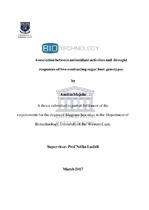| dc.description.abstract | Sugar beet (Beta vulgaris L), which belongs to the Amaranthaceae family is a biennial crop
widely used as a source of domestic sugar in the European countries, United States, China
and Japan. However, in South Africa, sugar cane is the sole source of natural sugar and
therefore sugar beet is a potential source of bioethanol since it would not be in direct
competition with a food crop for sugar production. Thus, sugar beet can be utilized as a
renewable source of energy, reducing the need and use of fossil fuels (such as petrol) that
produce greenhouse gases and consequently cause global warming and climate change.
Nonetheless, drought stress is one of the major factors limiting the growth of sugar beet,
resulting in sugar beet yield reductions worldwide. | |

